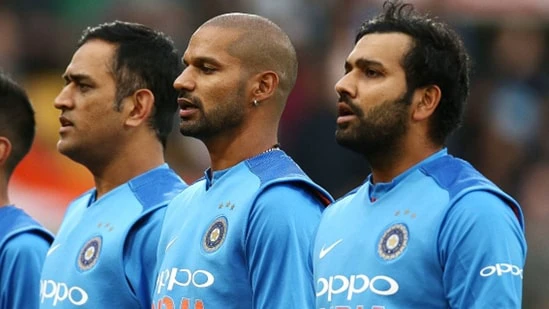Shikhar Dhawan’s new autobiography doesn’t just revisit runs, hundreds, and broken partnerships. It quietly reopens one of the most gossiped-about chapters of Indian cricket.
The supposed rift with Virat Kohli during the 2014-15 tour of Australia, and how MS Dhoni stepped in with one joke and shut the circus down.
In ‘The One: Cricket, My Life and More’, written with Chandresh Narayanan and Namita Kala, and published by Harper Sport in 2025, Dhawan revisits Brisbane 2014, an injured hand, a scrambled batting plan, and a dressing room suddenly being dissected on television by people who weren’t inside it.
Dhawan’s version of the incident
Dhawan recalls how, after being hit on the hand, he had to retire hurt and did not walk out the next morning as originally planned. Virat Kohli, he says, was asked to pad up at short notice, and the change of plans was later spun into a story of anger and confrontation between the two senior batters. In his telling, wild stories, “canards” as he calls them, filled the space that should have belonged to a simple medical update and a tactical adjustment.
What mattered to him, though, was what happened next. Dhawan writes that MS Dhoni took the heat on himself at the press conference rather than the narrative turn into ‘Dhawan vs Kohli’. When the inevitable question about a dressing-room rift came, the Indian captain smiled and swatted it away with a line that has since become folklore, “Whoever has passed on this information deserves to write for a Marvel or Warner Bros superhero movie!”
Dhawan remembers that one punchline as the moment the mood lifted. In a few seconds, Dhoni told the world that the story was fiction, without attacking any individual or media house. The opener portrays it as a masterclass in leadership, firm, funny, and completely protective of his players.
The episode also becomes a window into Dhawan’s own coping mechanism. He writes that he eventually made peace with the fact that it is a journalist’s job to chase stories, and a commentator’s job is to express opinions, even when those opinions sting. The only way to survive, he suggests, was to guard his mental space: not the criticism, but not let it burrow into his self-belief.
Dhoni’s quiet goodbye, through Dhawan’s eyes
From Brisbane, the book jumps to Melbourne in December 2014, and Dhoni’s sudden Test retirement. Dhawan says there was no grand hint of what was coming; only in hindsight, coach Duncan Fletcher looked unusually shell-shocked after the Test. When the BCCI press release landed, the dressing room, by his account, was stunned.
Dhawan describes walking up to Dhoni, giving him a tight ‘jhappi’ and congratulating him on a great career, while teammates around them processed the news with a mix of disbelief and emotion. He writes that Dhoni had an instinctive sense of timing and ‘knew’ it was the right moment to pass the Test baton to Kohli, even if the rest of the group hadn’t seen it coming. Without Dhoni, he admits, everyone understood the road ahead in Test cricket would be steeper.
The final pages of this section zoom out. Dhawan’s India debut in 2010 came under Dhoni’s captaincy; his explosive 187 in Mohali, his big-tournament reputation in ODIs, and his role as a top-order mainstay all unfolded with Dhoni’s backing in the background. Now, as he watches a new generation led by Shubman Gill and Yashasvi Jaiswal, the book uses these anecdotes to do two things at once: defend his own story from old rumours, and quietly underline how much of his journey was shaped by a captain who could, with one joke, change the atmosphere of the room.
